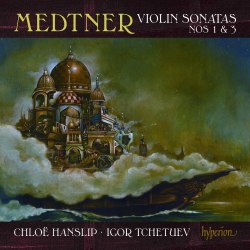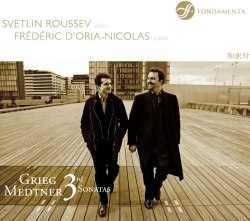| 

Support
us financially by purchasing this disc from |
 |
 |
|
Nikolai MEDTNER (1880-1951)
Violin Sonata No.1 in B minor, Op.21 (1909-10) [21:50]
Violin Sonata No.3 in E minor, Op.57 Sonata Epica (1938) [46:47]
Chloë Hanslip (violin)
Igor Tchetuev (piano)
rec. February 2012, Concert Hall, Wyastone Estate, Monmouth
HYPERION CDA67963 [68:39]
Nikolai MEDTNER
Violin Sonata No.3 in E minor, Op.57 Sonata Epica (1938) [42:50]
Edvard GRIEG (1843-1907)
Violin Sonata No.3 in C minor, Op.45 (1886-87) [22:25]
Svetlin Roussev (violin)
Frédéric D’Oria-Nicolas (piano)
rec. November 2008, Ferme de Villefavard
FONDAMENTA FON-0902002 [65:14]
It’s always good to welcome Medtner’s violin sonatas, works that make an appeal to musicians of discrimination. On Hyperion Chloë Hanslip and Igor Tchetuev play the First and Third whilst in a disc recorded back in 2008 Bulgarian violinist Svetlin Roussev and Frédéric D’Oria-Nicolas play only the Third, the Epica, adding the rather more conventional Grieg Third to form their programme.
Thus the sonata they don’t share is the First, composed in 1910. Hanslip unfolds this with a dreamy legato - a kind of painterly half-light - in an arc of elegant, refined tonal purity. This is beautiful, but at a more pressing tempo, with greater ebb and flow, one finds much more overt expression in the composer’s own recording with Cecilia Hansen, recorded in 1947 but never released commercially until it eventually appeared on APR5547. Hanslip and Tchetuev are not quite con fluidezza here and in the central scherzo, a delicious Dance, they set a perfect tempo but spoil things by being too metrical. The caprice that Hansen and Medtner find here characterises the music with great vigour, the rubati and expressive lightening admitting a rich array of portamenti from the violinist. The Hyperion duo’s relatively metronomic approach drains this movement, unfortunately. So, too, the bell-toll effects in the finale, which Tchetuev fails to bring to life; listen to Medtner, whose outsize bass ringing surely signifies how the music should go. Hansen struggles a little technically in the finale, whereas Hanslip doesn’t. But the former finds a powerful grace whilst the latter is rather withdrawn.
Being withdrawn is an even greater danger in the Epica of 1938 which was premiered by the composer and his friend, the distinguished British violinist Arthur Catterall. Roussev and D’Oria-Nicolas, in a much more present acoustic, drive through the sonata in dramatic style, taking one of the briskest tempi I can recall hearing. Hanslip and Tchetuev take a conventional approach in that respect. This big four-movement work needs a strong point of view and it certainly gets one from the Fondamenta team; they’re occasionally rough-hewn and Roussev is neither as lyrical nor quite so dead-centre-of-the-note as Hanslip. Against that however he brings a far greater sense of urgency, passion and skittish vibrancy to bear. He characterises the charming little dance motif in the first movement more vitally, although arguably less wittily than Hanslip. The difference in aesthetic approaches is wide; in the scherzo she is again reserved, he intense, and whilst Hanslip plays charmingly in the slow movement it’s Roussev who’s the more communicative player, the more fluid and stylistically apt; he makes far more sense of things - note the structural sense he makes of the trilling episode, whereas for Hanslip the trills are more of a decorative exercise. In the finale Roussev takes 11:50 to Hanslip’s 13:12, and he brings sweep, brio and bravado to bear - even too much on occasion. Some of Hanslip’s passagework sounds, to me, too by-rote.
In their disc Roussev and D’Oria-Nicolas offer an engaging but not wholly successful, occasionally ‘stagey’ performance of Grieg’s C minor sonata, though they’re incapable of dullness. I wish they’d added a more compelling sonata to their Medtner; why not the first or second of his sonatas or something by Catoire?
As for the two sonatas under review the classic recording of No.3 is by Oistrakh and Goldenweiser, and the composer’s recording with Hansen of No.1 is required listening for the historically minded. Laurence Kayaleh and Paul Stewart offer the sonatas for Naxos, but I’ve not heard them. Of other more recent players the duos of Parikian and Milne, and Mordkovich and Tozer offer all the sonatas, and I strongly prefer the greater dash of the former. Alexander Labko and Evgeny Svetlanov’s sonata cycle is marooned in an all-Svetlanov Medtner box on SVET but they offer strong, resilient readings. Unfortunately, for all their precision and lyricism, I can’t say that Hanslip and Tchetuev offer anything like such authoritative and characterful performances.
Jonathan Woolf
 |
 |
|











